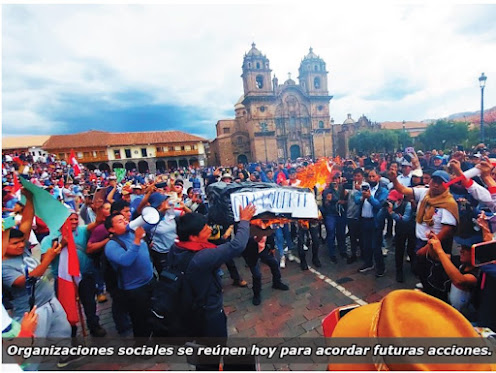Peru News Summaries for September 12, 2024
Alberto Fujimori dies: latest news of the wake at the Ministry of Culture
Former President Alberto Fujimori died at the age of 86 after suffering various complications in his state of health
- Former President Alberto Fujimori has died at the age of 86 after suffering various health complications.
- His remains are are on view at the Ministry of Culture from Thursday, September 12 to Saturday, September 14.
- The Peruvian government has declared three days of national mourning on September 12, 13 and 14 for his death.
- Fujimori was President of Peru between 1990 and 2000 and during his government economic measures were implemented that managed to stabilize the country's economy, but human rights violations were also committed.
- After his departure from power, Fujimori went into exile in Japan, but in 2007 he was extradited to Peru to face charges of corruption and human rights violations.
- In 2009 he was sentenced to 25 years in prison, but in 2017 he received a humanitarian pardon from then-President Pedro Pablo Kuczynski.
- His death has generated mixed reactions in Peruvian society, with some considering him a hero and others seeing him as a dictator.
Fujimori dies without answering to justice for forced sterilizations: "The crime against humanity committed by Fujimori cannot be forgotten" - Wayka
Neither pardon nor forget.
- In six years, from 1995 to 2001, more than 272,000 women and 22,000 men, mostly Quechua speakers and impoverished, were sterilized as part of the so-called National Reproductive Health and Family Planning Program (PNSRPF), which actually consisted of a systematic practice of population control, racism and violation of women's rights.
- Many of these women were deceived, threatened and subjected to surgery without their consent or without being fully informed, which is a crime against humanity.
- Fujimori denied his responsibility for these events until the end of his days, despite the evidence and testimonies that incriminated him.
- Although the former dictator can no longer be tried, the criminal proceedings for forced sterilizations continue against other defendants, such as Eduardo Yong Motta, Marino Costa Bauer and Alejandro Aguinaga, former health ministers.
- The case is also found in the Inter-American Court of Human Rights, where the Peruvian State was denounced for this crime.
- Fujimori died on the same day as Abimael Guzmán, leader of the Shining Path, without receiving a sentence for this crime, but his responsibility is recorded in history as an act of violation of human rights.
Alberto Fujimori: books and films that recorded his dark legacy
- Alberto Fujimori, former dictator of Peru, died on September 11, 2024 at the age of 86, leaving a debt of s/57,000,000 in civil reparation. Fujimori was imprisoned for 16 years for crimes against humanity committed during his regime, including the massacres of Barrios Altos and La Cantuta, perpetrated by the Colina Group.
- Among the most outstanding studies on his figure is the book The Last Dictator by José Alejandro Godoy, which relates the most significant events of his life and government, marked by violence, corruption and authoritarianism. Other important works include Pájaros de Medianoche by Inés Ruiz Alvarado, which addresses the forced sterilizations of more than 300,000 women during his government, and The Decade of the Anti-Politics by Carlos Iván Degregori, which highlights the complicity of different social sectors with the regime.
- In the cinema, His name is Fujimori (2016) by Fernando Vilchez offers a look at his arrival to power in 1990 and the most critical moments of his mandate, while Caiga Quien Caiga from Eduardo Guillot Meave (2018) focuses on Vladimiro Montesinos, his main advisor and representative of corruption during the regime. Another important documentary is La Cantuta: En la boca del diablo, directed by Amanda González, who investigates the massacre of students in 1992.
- Fujimori left a legacy marked by human rights violations, corruption and the 1992 self-coup. However, some sectors recognize that relative economic stability and the defeat of the Shining Path were achieved during their term of office. Despite these actions, the social and political wounds of his government remain latent in the country's history.
Institute for Legal Defense-Reporters: "For the first time in the history of the region, freedom of the press becomes a crime"
(IDL-Reporteros - Spanish)
- IDL-Reporters, a Peruvian media outlet, interviewed Catalina Botero, former Inter-American Court of Human Rights (IACHR) freedom of expression rapporteur, about the situation of press freedom in the region.
- Botero warns that freedom of the press is in danger in the region and that, for the first time in history, it is becoming a crime.
- The interview takes place in the context of the recent protests in Peru, where there have been attacks against journalists and the media.
- Botero points out that the attacks against the press are an attempt to silence critical voices and prevent citizens from reporting on what is happening in the country.
- The former IACHR rapporteur calls on the international community to condemn attacks on the press and to demand that governments guarantee freedom of expression.



Comments
Post a Comment